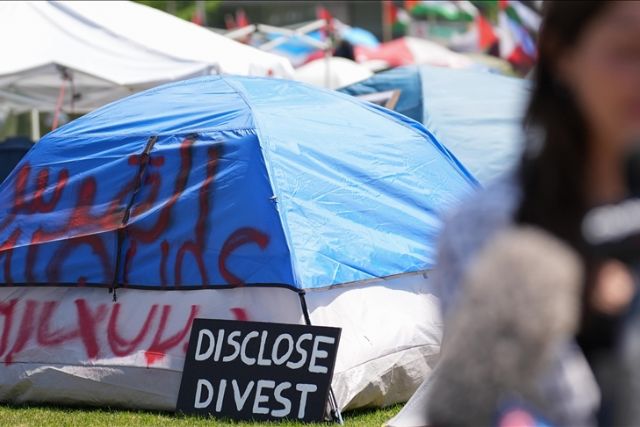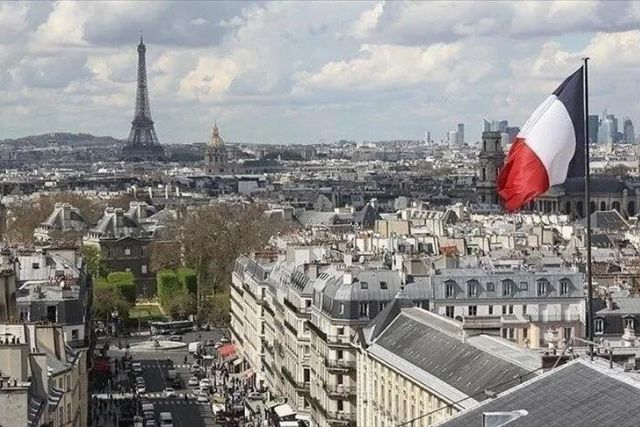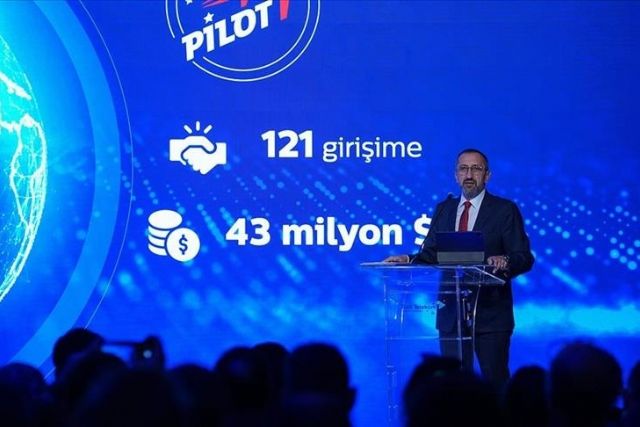Turkish presidential aide says 1st attempt made on joint mechanism between Turkey, US
Ankara sends letter to Washington on establishment, functioning of mechanism on bilateral ties

WASHINGTON
Ankara sent a letter to Washington on the establishment and functioning of a mechanism on bilateral relations and issues agreed on by Turkish President Recep Tayyip Erdogan and his US counterpart Joe Biden, said Turkey's presidential spokesman.
Ibrahim Kalin visited the US to attend the 20th MAS-ICNA (Islamic Circle of North America-Muslim American Society) Annual Convention in Chicago that brings together tens of thousands of Muslims from all over the world. In an exclusive interview with Anadolu Agency, Kalin answered questions, particularly on Turkish-American relations.
Q: You have been at the MAS-ICNA Convention held by Muslim umbrella organizations in Chicago for three days. You met with Muslim opinion leaders. Can you comment on this convention and your meetings with Muslim opinion leaders?
A: The MAS-ICNA meeting is the largest annual meeting of the American Muslim community. It is held in Chicago every year at Christmas time and there is really great participation. We try to participate as much as possible. Of course, we have Turkish citizens living here, and they participate. This year, we are here with our ambassador (Turkey's Ambassador in Washington Hasan Murat Mercan), our consul (Turkey's Consul General in Chicago Engin Turesin). We have other student friends. We held various meetings to represent our country as much as possible and to strengthen the relations between the American society and the prominent leaders of the society and Turkey. It was a very productive meeting.
As you know, Turkey has a special place for the American Muslim community because many of them come to Turkey. Some people come and invest, some come to Turkey for vacation or education programs. This place (convention) also provides a good environment for Turks living in the US to mingle with other Muslim communities. Here, of course, the American Muslim community is made up of extremely diverse elements, and their representatives are here in groups. Of course, the US is a big country, people are living in different ways in many different parts of the country. Of course, we have always cared about strengthening our ties with them. As you know, every time our president comes to the US, he always receives and talks with the leaders of the American society in New York if he is in New York, or Washington if he is in Washington, or in other cities he visits. We care about these relations in terms of our ties with the US in general, because the prominent representatives and leaders of the American Muslim community hold different positions in many fields from politics to the economy, from the media to local politics, and we care about strengthening relations with them for our country.
Foreign Ministry sent letter to US for joint mechanism
Q: You talked about relations with the US. 2021 is about to be over and there has been a new administration in Washington for nearly a year. You have spoken to your counterpart many times. Can you evaluate the Turkish-American relations in 2021 to cover the approaches of the new administration?
A: Now, Turkish-US relations have a long and deep-rooted history. Our relationship is defined at the strategic partnership level, we are also two allied countries within NATO. But we also witness that the US policies which do not take into account Turkey's national interests from time to time move away from this spirit of alliance. There are two to three main issues that overshadow and poison Turkish-US relations, on which we cannot agree. One of them is the support given to the PYD and YPG by the US administrations since the (former US President Barack) Obama period. We have said this support was a wrong policy from the very beginning, and we repeatedly state that it needs to be changed. Once support has been given to the PYD and YPG for the fight against Daesh (ISIS), you cannot eliminate a terrorist organization by supporting another terrorist organization in principle. Secondly, everyone knows that the YPG and PYD in Syria are the Syrian branches of the PKK. Americans know this too, others know as well. Thirdly, it should be underlined that it has created great discomfort, especially within the Syrian society. Because if you try to build a policy about Syria by pulling a group to your side -- in other words, only one ethnic group within the Syrian opposition and society, or a certain group from within that group that is a Kurdish group that supports the PKK or is a member of the PKK -- it is obvious that there will be great difficulties in terms of territorial integrity, political unity and future of Syria. This is one of our main issues of contention.
Secondly, there are CAATSA (Combating America's Adversaries Through Sanctions Act) sanctions that are unfairly applied to Turkey due to the S-400 issue. Again, within this framework, we were subjected to unfair and unlawful practices such as removing Turkey from the F-35 program.
Thirdly, the fact that the US has not taken concrete steps regarding the FETO (Fetullah Terrorist Organization) structure in the US, which does not satisfy us, constitutes the main points of dispute in the relations between Turkey and the US. Our expectation, of course, is to implement a policy review process that takes into account Turkey's national interests. When the Biden administration came to power, after the Trump era, we contacted them at every level and expressed our concerns and demands on these issues, and we continue to do so. Finally, as you know, in the meeting of our president with Mr. Biden on the margins of the G20 Summit in Rome, these issues were discussed in detail. Not only these controversial issues, but also developments in the Caucasus, the process in Syria, Iraq, the fight against terrorism, the Eastern Mediterranean, and other issues, and developments in Ukraine were also discussed in detail.
As a result of that meeting, it was agreed to establish a mechanism that will deal with all issues in Turkey-US relations. Currently, our Foreign Ministry has sent a paper to the American side on how the structure of this mechanism will be, what issues will be addressed and how the process will work. Our work on this continues. Comprehensively, we want to conduct these relations based on mutual interest and respect, as an equal, fair, and transparent relationship, but while doing this, of course, Turkey's own national interests, priorities, and threat perception come first. In this context, our negotiations continue to advance these relations on the right ground and act with a positive agenda, and we will continue to work in this direction from now on.
Q: There are meetings between the Turkish-US defense delegations, and a mechanism is being established between the foreign ministries, based on what you mentioned. Do you think it is possible to open a new page between Turkey and the US? What are your expectations for the next year in this regard?
A: If certain conditions are met, if certain steps are taken, especially on the issues related to Turkey's threat perception and national security interests, a new page will be certainly opened. These relations can progress with a much more positive agenda, but of course, we can't proceed by ignoring or delaying the main issues. Despite this, we will continue to do our best to solve these problems with a positive agenda, from the defense industry to the fight against terrorism, from trade to regional issues to develop a relationship based on mutual interest and respect.
If Turkey has a role in Ukraine crisis, Turkey will take it
Q: There are concerns in the capitals of Western countries that Russia may attempt a second invasion of Ukraine. What is Turkey's position on this issue, and what exactly is Turkey's path towards solving this crisis?
A: First of all, we are following the tension between Russia and Ukraine with great concern. Our president has also constantly addressed this issue in his meetings with both Mr. (Russian President Vladimir) Putin and Mr. (Ukrainian President Volodymyr) Zelensky, as well as in meetings with other European leaders, the president of the US, and other regional leaders. Our advice to both parties is to lower this tension as soon as possible and take the necessary steps to prevent a military conflict in the Donbass region in eastern Ukraine. In this regard, our president told Zelensky and Putin that if Turkey or himself is expected to play a role in this issue, they can do their bid. Here, of course, reducing the tension is in everyone's interest.
A new military conflict, Russia's entry into Ukrainian territory, some military movements in or on Ukraine, the mobilization of militia forces, or experiencing conflicts will not benefit anyone.
It will further increase tensions in the entire region. Thousands of Ukrainians have already lost their lives due to this tension, and we, of course, have good relations with Russia in principle, but at the same time, we have a clear stance on the protection of Ukraine's territorial integrity. Our advice to both parties is to stay away from such a conflict, reduce tensions, and to settle their issues through negotiations. If there is a role for Turkey in this direction, Turkey will certainly play it. Because Turkey has good relations with both countries at the same time. There are not many countries like Turkey today. In other words, some countries have relations with Ukraine, but their relations with Russia are not good, some are the opposite, but our president has very good relations with both Mr. Putin and Mr. Zelensky.
In other words, if there is a role that Turkey can play in the implementation of smart diplomacy and an effective diplomatic process in this period, of course, our president will happily fulfill it. The international community also needs to be very careful. It is of great importance that they display an approach aimed at reducing tensions and resolving problematic issues between the two sides, rather than escalating statements or attitudes. Because, you know, the issue is not just between Russia and Ukraine. When you look at it from a larger perspective, the issue is reflected in Ukraine as a result of the tension between Russia and the Western alliance, Russia and NATO, Russia and America, and Europe. As we are in constant contact with the Western alliance, the US, Europe, and a part of that alliance and a NATO member country, we are in the process. Our advice to the Americans and Europeans is to take genuine, concrete, and convincing steps to reduce tensions If this is achieved, of course, an important ground for the solution of the issue will be formed, a new climate will be formed, and everyone should do their best to support this. This is our main advice to everyone.
Armenian diaspora needs to act responsibly
Q: Moscow will also host the process of normalization of relations between Turkey and Armenia. Can I get your assessment of the process of normalizing relations with Armenia?
A: If you remember, when Turkey ended its diplomatic relations with Armenia and closed its border gate in 1992, the main issue was the (Armenian) occupation of Karabakh. Today, with the victory that came after the 44-day war last year, the Karabakh problem has been resolved. Karabakh has regained its original place as the Azerbaijani territory and the issue that caused us to end our relations with Armenia in 1992 has also disappeared. So, there is no reason not to normalize it anymore. From the very beginning, our president already had said Turkey would also take steps to normalize relations with Armenia in parallel with the process between Azerbaijan and Armenia. Therefore, as you know, special representatives were also appointed in this direction.
I believe that the process will rapidly and constructively advance from now on. There is also a will on the Armenian side in this direction. Our will is already clear and specific on this matter. We do not have a biased approach towards Armenia. As our neighbor, of course, we want the border to be re-opened and diplomatic relations to restart. For this, certain conditions must be met and certain issues must be negotiated. The process, which will be carried out by special representatives, aims at exactly this.
Here, I would like to underline the following: Armenia's normalization of relations with Azerbaijan and Turkey will contribute to the whole region and will also benefit Armenia more. Because Armenia is a small, poor, underpopulated, and landlocked country, with extremely limited trade routes. If Armenia signs a peace treaty with Azerbaijan, its relations with Azerbaijan will improve. If its relations are normalized with Turkey, different developments will occur in many areas from border trade to border security, to flights of Turkish Airlines, and all these will benefit Armenia and the people of Armenia. We also have very good relations with the Armenian citizens living in our country. God forbid, we have always taken a very clear stance in case of discrimination or an attack against them. We have relations with the Turkish Armenian community at all levels. They can reach us at any time when they have a problem.
Normalization with Armenia will certainly enable Turkish Armenians to establish relations with Armenia more easily and bring relief in other areas, but the Armenian diaspora, which is concentrated in two countries of the world, including France and the US, must also act responsibly. Claiming that the 1915 events were "genocide" through certain obsessions and bringing it to the agenda as a precondition will no longer benefit anyone, especially after this point. Now a new page has been opened in the Caucasus, a new era has begun, and the diaspora communities should also see this truth, and they should adopt a manner and attitude that will be for the benefit of Armenia and the benefit of the region. If this happens, everyone will benefit from it. A new period of peace and stability begins in the Caucasus and all countries benefit from it.
Turkey to continue to stand by Libyan people, legitimate government
Q: As you know, the election process in Libya is stuck. The election has been postponed and there is political uncertainty in the country. What does Turkey offer to overcome this crisis, and can you talk about Ankara's contributions to the resolution of the crisis?
A: We have supported the political process in Libya from the very beginning to the end, and we will continue to support it from now on. Elections were one of the steps and stages of this political process. We made the necessary suggestions for it to be held, but the Libyans decided to postpone the elections with an agreement among themselves since the conditions were not suitable there. There is an ongoing political negotiation process among the Libyans on how long the elections will be postponed, what will happen in the postponement process, who will manage this process and how will different issues from political party law to the constitution be settled in this period until the next elections. We are supporting this process and will continue to do so.
It is something that we have supported from the very beginning, that the eastern, western, and southern groups come together in Libya and that legitimate actors take part in a legitimate political process. In this process, you know, we signed an important agreement with Libya. These are the Maritime Boundary Treaty and the Military Cooperation and Training Agreement. These agreements still remain valid. Even if there are objections from some groups in Libya or some countries in the region, Libyans have a very clear and unequivocal stance on this issue. In other words, the legitimate Libyan government has no objection to these agreements, and they have the will to continue these agreements as they are. This is pleasing for us. Therefore, as Turkey, we will continue to stand by the Libyan people and the legitimate government, both in terms of security, supporting the political process, and rebuilding Libya, and strengthening its infrastructure. Hopefully, this new political process is announced to everyone with a new calendar and a transparent roadmap as soon as possible without causing any tension or conflict. We will continue to stand by the Libyans as a supportive and facilitating actor in the process led by the Libyans, whenever they will be held, and in whatever way, they will be planned.
2021 was difficult year
Stressing that 2021 was a difficult year considering the effects of the COVID-19 pandemic, he said: “This (pandemic) has had very different effects on people's social mobility, individual life, of course, on the global economy, national economies, and regional developments.”
“There have been natural disasters. I hope 2022 will be the year where peace, prosperity, stability, and trust are rebuilt and spread for all of us, and a year all can benefit equally from blessings, wealth, peace, stability, and security. As Turkey, we will continue to play its role both in our own region and in global issues, under the leadership of our president. He has been saying for a long time, ‘The world is bigger than five.' We saw once again how fragile the global system was, bigger than the world's five and all other countries combined. At the same time, our president also made a call that 'a fairer world is possible. He also wrote a book about it. This is not a technical call to reform the UN Security Council or the UN structure. He says that a world in which economic, political, and social justice dominates is possible, where the differences between the rich and the poor, the northern and the southern, the advantageous and the disadvantaged, the east and the west do not turn into the abyss, and where our differences are experienced as wealth.
In this direction, from the environmental crisis to climate change, to the fair sharing of economic resources, to ensuring security, peace, and stability, every country, from the biggest to the smallest, has a big role. I hope 2022 will be a year when awareness and consciousness rise, mind, conscience, emotion, humanity, mercy, and compassion prevail, and world politics are directed.
*Writing by Gozde Bayar in Ankara.





